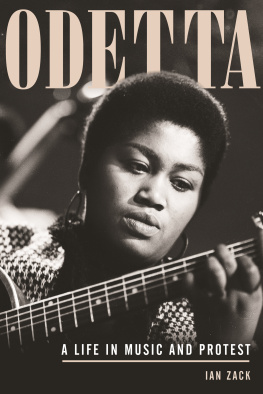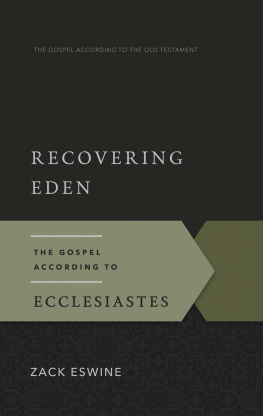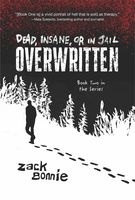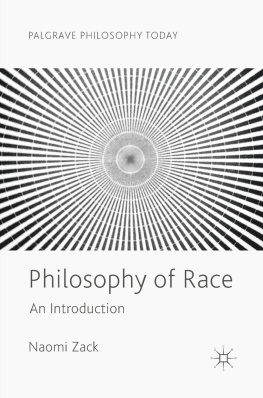Ian Zack - Odetta
Here you can read online Ian Zack - Odetta full text of the book (entire story) in english for free. Download pdf and epub, get meaning, cover and reviews about this ebook. year: 2020, publisher: Beacon Press, genre: Non-fiction. Description of the work, (preface) as well as reviews are available. Best literature library LitArk.com created for fans of good reading and offers a wide selection of genres:
Romance novel
Science fiction
Adventure
Detective
Science
History
Home and family
Prose
Art
Politics
Computer
Non-fiction
Religion
Business
Children
Humor
Choose a favorite category and find really read worthwhile books. Enjoy immersion in the world of imagination, feel the emotions of the characters or learn something new for yourself, make an fascinating discovery.
- Book:Odetta
- Author:
- Publisher:Beacon Press
- Genre:
- Year:2020
- Rating:4 / 5
- Favourites:Add to favourites
- Your mark:
- 80
- 1
- 2
- 3
- 4
- 5
Odetta: summary, description and annotation
We offer to read an annotation, description, summary or preface (depends on what the author of the book "Odetta" wrote himself). If you haven't found the necessary information about the book — write in the comments, we will try to find it.
Odetta — read online for free the complete book (whole text) full work
Below is the text of the book, divided by pages. System saving the place of the last page read, allows you to conveniently read the book "Odetta" online for free, without having to search again every time where you left off. Put a bookmark, and you can go to the page where you finished reading at any time.
Font size:
Interval:
Bookmark:

Say No to the Devil:
The Life and Musical Genius of Rev. Gary Davis

To fighters for freedom, then and now
He would not Africanize America, for America has too much to teach the world and Africa. He would not bleach his Negro soul in a flood of white Americanism, for he knows that Negro blood has a message for the world. He simply wishes to make it possible for a man to be both a Negro and an American, without being cursed and spit upon by his fellows, without having the doors of Opportunity closed roughly in his face.
W. E. B. DUBOIS
Perhaps, in the end, where your anger comes from is less important than what you do with it.
HARRY BELAFONTE
Odetta is based on hundreds of hours of interviews I conducted over a period of four years with more than seventy-five people, including friends, loved ones, fellow musicians, and music promoters; information I culled from thousands of newspaper clippings, scores of archival interviews, legal documents, and Odettas personal papers, which are currently housed at the New York Public Librarys Schomburg Center for Research in Black Culture; and a heartfelt listening to the music that gushed like wildfire from her troubled soul. Odetta gave hundreds of interviews over the course of her half-century career in show business, but she had difficulty remembering names and dates, and she didnt keep detailed diaries that we know of. Where no shred of paper spelled out her itinerary or her feelings about a given topic, I relied on the testimony of those who knew her and the revelation of her art to tell her story. I hope the reader finds, as I did, much to admire in her lifelong search for freedom.
I n the fall of 1952, at a party outside Los Angeles, Odetta made the walls come down, or so it seemed. Pete Seeger witnessed it and so did Woody Guthrie. They had gathered with a group of young musicians at a home in Topanga Canyon to sing folk songs in a round-robin affair known as a hootenanny.
As everyone took their turns one by one, Seeger couldnt help but notice the young black woman, tall and heavy set, with short, kinky hairnot straightened, as was the accepted style then for African American womensitting alone, observing the others with a warm smile but keeping her distance. With encouragement, she finally agreed to sing, and the room stilled as she rose with her guitar, gathering herself. Head back, eyes closed, she belted out Take This Hammer, the chain gang song first made famous by Lead Belly. Her voice, so impossibly huge that it seemed to rumble from the heavens, nearly felled the others in the room.
We had to hunt to find her, very shy, sitting in the farthest corner, Seeger remembered. But when she was persuaded to sing, power, power, intensity and power!
Her friends knew the then-unknown singer as Odetta Felious, but shed soon drop her surname, tackle her stage fright, and bill herself simply as Odetta.
It was a tense political moment for the nation. Amid the witch hunts, which targeted artists of all stripes, Seeger and members of his hit group the Weavers had recently been outed as Communists. The rest of the folk music movement, harassed by the FBI, the House Un-American Activities Committee, and other Red-baiters, was running scared, lying low, or hiding underground.
But if McCarthyism was at its height then, two other currents were quietly gathering force: a rising youth culture and the civil rights movement. Odetta would help spur both on, letting loose her thunderous singing in concert halls across the nation. With her opera-trained voice, she would help ignite the folk revival that swept America in the late 1950s and early 1960s, singing ballads and prison songs with a passion and intensity that thrilled audiences and attracted a host of followers, from Harry Belafonte, Joan Baez, and Bob Dylan to Roger McGuinn, Janis Joplin, and Carly Simon. Odettas impact, especially on a good chunk of the female singers who came of age then, was vast.
It always starts with one thing that kind of points you in that direction, one person becomes the arrow, Simon recalled, looking back on her own career. I mean I didnt know I wanted to sing until I heard Odetta.
No less important, Odettas rise coincided with the flowering of the civil rights era, and her songs about freedom and the plight of prisoners and the downtrodden helped inspire activists and the general public alike, providing lessons in black history that werent being taught in schools. Odettas artistry, her regal bearing, and her brave decision to stop straightening her kinky hair were a potent expression of black pride just at the moment when middle-class America was beginning to warm to the idea that the nation could no longer deny the fruits of full citizenship to African Americans.
Born in Birmingham, Alabama, during the height of Jim Crow, Odetta wasnt the first black folk singer to channel intense anger into great art. But she found a more receptive audience than, say, Lead Belly, who had often shouted with violence when he sang, in the words of the jazz and blues scholar Frederick Ramsey. Like Lead Belly, a paroled murder convict from Louisiana whose real name was Huddie Ledbetter, Odetta poured her darkest emotions into her music, and that partly accounts for her immense power. But if he had aroused fear in white America after his discovery in the 1930sTime magazine once described his coal-black face gleaming fiercely and his horny hands scratching his twelve-string guitarthe soft-spoken and dignified Odetta conjured hope. Her soaring vocals and preternatural ability to inhabit the characters she sang about left her predominantly white audiences spellbound and a little more open to the notion that someone could be both wonderfully American and proudly black at the same time.
Odetta, in fact, gave them cause to celebrate blackness. She is more than an eloquent Negro voice, one reviewer would note in the 1960s. She is the eloquent voice of the Negro. As blacks demanded freedom at Southern lunch counters, at voter registrar offices, and on frontline protest marches before seething sheriffs deputies, many Northern whites were looking to embrace the nations better angels. The young woman with the trailblazing Afro, who sang about prisoners and chain gangs and talked about the black history not being taught to schoolchildren, helped rouse a political consciousness among a searching and surging youth generation.
For a brief but seminal period, Odetta was a star, selling out concerts in the US and around the world, appearing on TV and in films. Our cultural memory can be short-lived, but at the height of her fame, Odettas singing and magnetic stage presence exerted such a force over her acolytes that sometimes their knees went weak, they fainted in front of her, or they tried to steal her food in the hope that it contained some kind of magic elixir.
Her freedom songs echoed not only in clubs and college auditoriums but during the March on Washington, the Selma to Montgomery march, and countless other protests and rallies for civil rights and the many other righteous causes Odetta supported, from early childhood education to nuclear disarmament. The Rev. Martin Luther King Jr. understood the crucial role that music, and Odettas in particular, could play in pushing the cause of freedom. Odetta was by far one of his favorites, Kings friend and collaborator Harry Belafonte remembered decades later. He was a great lover of art and culture. He understood its power.
Font size:
Interval:
Bookmark:
Similar books «Odetta»
Look at similar books to Odetta. We have selected literature similar in name and meaning in the hope of providing readers with more options to find new, interesting, not yet read works.
Discussion, reviews of the book Odetta and just readers' own opinions. Leave your comments, write what you think about the work, its meaning or the main characters. Specify what exactly you liked and what you didn't like, and why you think so.









